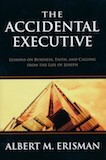Paul’s Eulogy
Daily Reflection / Produced by The High Calling
Praise be to the God and Father of our Lord Jesus Christ, who has blessed us in the heavenly realms with every spiritual blessing in Christ.
Ephesians 1:3
I know what you may be thinking. That doesn't sound like a eulogy. I have called this reflection "Paul's Eulogy," but there's nothing in Ephesians 1:3 that meets our expectations for what a eulogy contains. We use the word "eulogy" to describe a short speech or written piece that praises someone who has recently died. Most memorial services include eulogies, and they don't sound anything like "Praise be to the God and Father of our Lord Jesus Christ, who has blessed us in the heavenly realms with every spiritual blessing in Christ" (1:3). So why am I calling this Paul's eulogy?
If you were reading this verse in Greek, you'd immediately see what I mean. Let me give you a transcription of the Greek text, with three words highlighted: eulogetos ho theos kai pater tou kuriou hemon Iesou Christou, ho eulogesas hemas en pase eulogia pneumatike en tois epouraniois en Christo. Now you're beginning to see why Ephesians 1:3 could be called a eulogy. This verse uses three Greek words that are closely related to each other and serve as the etymological root for our word "eulogy." Eulogetos means "praise be to" or "blessed." Eulogesas is a form of the verb eulogeo, which means "to bless" or "to bestow a special favor upon." Eulogia is the Greek noun that means "praise" or "blessing" or "generous gift." All of these Greek words are derived from the roots "good" (eu) and "word" (logos). No other verse in the whole Bible has three uses of eulog- words. No other verse could better be called a eulogy.
So what is the point of Paul's eulogy? It sets up the whole passage from verse 3 through verse 14, which, as I mentioned before, is one sentence with 202 words. This sentence, full of rich, mind-stretching theology, is not a lecture or a tractate, however. It is a call to praise God. It is a summons to worship. It is an act of worship. Thus, the section begins with "Praise be to the God and Father of our Lord Jesus Christ" (1:3). Verse six mentions "the praise of [God's] glorious grace." Verse 12 adds that we are to "be for the praise of his glory." Verse 14 notes that we are marked with the Spirit, "to the praise of his glory." Thus, Ephesians 1:3 sets up the major purpose of the long first section by calling us to "praise" God. The long sentence that follows will explain why.
Tomorrow, I will say a bit more about the "eulogy" of Ephesians 1:3. For now, I would invite you to do as this verse says, and offer praise to God. You might want to read the whole passage from verse 3 through verse 14, allowing the words and image to shape your praise. Or you might simply take a walk outside, remembering God's blessings and what this says about his character. However it seems best to you, take some moments to praise "the God and Father of our Lord Jesus Christ."
FOR FURTHER REFLECTION AND ACTION: I would encourage you to do what I have suggested, spending some focused time praising God.
PRAYER: Praise be to you, O God, for all you have done and for who you are. I praise you for blessing me "with every spiritual blessing in Christ." I praise you for your unfathomable goodness and grace. I praise you for thinking of me, for caring about me, for choosing me, for reaching out to me in love, for saving me, for calling me to be for the praise of your glory. I praise you for the gift of your Spirit, who guarantees my future with you and who empowers me to serve you today.
All praise, glory, and honor be to you, O God and Father of our Lord Jesus Christ. Amen.
Images sourced via Creative Commons.






